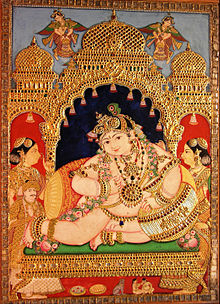Mukundamala
| Mukundamala | |
|---|---|
 Navaneeta Krishna, 19th century Thanjavur painting. | |
| Information | |
| Religion | Hinduism |
| Author | Kulasekhara Alvar |
| Language | Sanskrit |
| Verses | 40 |
The Mukundamala (
Description
Scholars identify Kulasekhara as one of the earliest
Hymns
| Part of a series on |
| Vaishnavism |
|---|
 |
The first hymn of the Mukundamala extols Vishnu's various attributes:[6]
śrī-vallabheti vara-deti dayā-pareti
bhakta-priyeti bhava-luṇṭhana-kovideti
nātheti nāga-śayaneti jagan-nivāsety
ālāpinaṁ prati-dinaṁ kuru māṁ mukunda
O, Mukunda! make me your glory great oft recount,
As Laksmi's consort dear, as the bestower bounteous,
As the all-merciful, as the great friend of the devout,
As the deft destroyer of earthly bondage, as my sole support
As the one lying on the serpent couch in sweet repose,
As the all-pervading Lord of the universe.— Mukundamala, Verse 1
The second hymn of the work directly addresses Vishnu's incarnation of Krishna:[7]
jayatu jayatu devo devakī-nandano ’yaṁ
jayatu jayatu kṛṣṇo vṛṣṇi-vaṁśa-pradīpaḥ
jayatu jayatu megha-śyāmalaḥ komalāṅgo
jayatu jayatu pṛthvī-bhāra-nāśo mukundaḥ
Victory, Victory unto Devaki’s celestial darling,
Victory, Victory unto Krsna, the beacon-light of Vrsni’s clan,
Victory, Victory unto Him, the cloud-hued, of body charming,
Victory, Victory unto Mukunda who rid clean The Earth of its unwholesome burden.— Mukundamala, Verse 2
See also
References
- ISBN 978-81-223-1084-9.
- ^ a b Noburu Karashima (ed.), A Concise History of South India: Issues and Interpretations. New Delhi: Oxford University Press, 2014. 143.
- ISBN 978-1-108-49457-1.
- ^ a b Narayanan, M. G. S. Perumāḷs of Kerala. Thrissur (Kerala): CosmoBooks, 2013. 65-66, 95-96, 383-5, 436.
- ISBN 978-1-61069-211-3.
- ^ Makarand Joshi. Mukunda Mala Of Sri Kulashekhar Alwar Sanskrit English By Satya Murthi Iyengar 1987. p. 2.
- ^ Makarand Joshi. Mukunda Mala Of Sri Kulashekhar Alwar Sanskrit English By Satya Murthi Iyengar 1987. p. 5.
